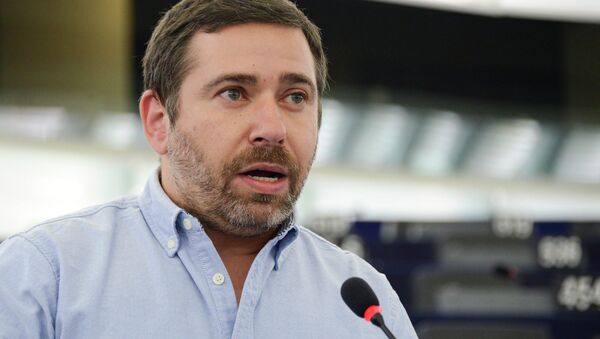MOSCOW, November 14 (RIA Novosti) – The US government fears rapprochement between France, Germany and Russia, which would lead Europe to move toward greater independence from the United States, the European Parliament's foreign affairs committee vice president Javier Couso told RIA Novosti on Friday.
"Washington never wanted political independence in Europe. Its main fear is the Paris-Berlin-Moscow axis because it will put an end to the Atlantic ties that practically turned [Europe] into a US colony," Couso, also a member of Spain's United Left (Izquierda Unida) coalition, said.
The lawmaker criticized Brussels for lacking an independent foreign policy, citing pressure from the United States to impose sanctions on Moscow. As the "anti-Russian" mood in Brussels swelters, according to Couso, some politicians even call for the North Atlantic Treaty Organization (NATO) to step in.
"The [European] Union played the role of a useful idiot for the US because it acted against its own interests," the legislator, whose brother working for Spanish television was killed by US forces in the Iraq war, reiterated in an interview with RIA Novosti. He added that Russia remains a great power and destabilizing its sphere of influence "will obviously have an impact."
Couso did not support the European Union's sanctions on Moscow due to his belief in the importance of "getting along" with neighbors, he told RIA Novosti. The parliament member pointed to the European Union's energy and economic dependence on the United States as reasons behind the strategic weakness of its foreign policy.
The European Union and the United States has imposed several rounds of sanctions against a number of Russian officials and companies in the defense, energy and banking systems in response to Russia's alleged role in the Ukrainian crisis. In response, Moscow introduced in August an import ban on certain food products from the United States, the European Union, Norway, Canada and Australia. Moscow denies its involvement in the conflict and has repeatedly said the use of "counterproductive" sanctions will have a boomerang effect on European economies.

